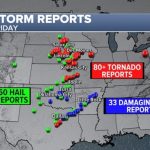

Despite increasing pressure from the U.S. to rein in the war in Gaza, Israel’s defense minister is now suggesting his forces could soon open a northern second front to push Iran-backed Hezbollah back from the Lebanese border.
Speaking to mayors and municipal leaders from the north, Israeli Defense Minister Yoav Gallant said on Wednesday the government would not encourage some 80,000 residents evacuated from northern communities near the Lebanese border to return home before Hezbollah is driven back beyond the Litani River in southern Lebanon.
The persistent fear from northern communities is that they are at serious risk of rocket attacks and incursions by Hezbollah.
In remarks cited by the Times of Israel and Haaretz, Gallant said in a meeting in Nahariyya, the northernmost coastal city in Israel, that the government hoped to push Hezbollah back through diplomatic means but, if that failed, would “act with all the means at its disposal” using military action.
You may like
The southern stretch of the Litani river runs parallel with the Israel-Lebanon border and 18 miles to its north. Under the terms of U.N. resolution 1701 that brought the 2006 Lebanon war to a close, Israel agreed to withdraw all its forces from southern Lebanon and Hezbollah was required to maintain no presence south of the river.
Hezbollah has not, however, honored its part of the bargain and over the years has entrenched itself in southern Lebanon in positions directly overlooking Israel’s border communities, launching rocket and missile strikes in recent weeks and days.
Israel has responded forcefully in a tit-for-tat cycle, prompting rising fears of escalation. U.S. officials have scrambled to try to contain any expansion of the conflict, and have warned Hezbollah not to open a second front against Israel.
Initially most of the skirmishing between Hezbollah and Israel was confined to strikes on military targets, remaining within what Lebanese politicians describe as the “rules of the game,” established informally to reduce miscalculation by Israel and Hezbollah over the years since they fought their 34-day war in 2006. But the exchanges are now going beyond the established rules and hitting civilian targets.
Gallant’s remarks on Wednesday go beyond those in November by Chief of Staff Lt.-Gen. Herzi Halevi, who also had meetings with local leaders from the north and sought to reassure them. At that meeting local leaders warned that northern evacuees would not return with Hezbollah wedged right up against the border.
“What is preventing them from firing a Kalashnikov from the fence at civilians in the border communities? After October 7, does anyone have any doubts about the intentions, threats, and capabilities of our enemies beyond the border?” Avichai Stern, a local mayor, said at the November meeting.
Around 80,000 residents of communities located up to 10 kilometers south of the Lebanon border have been evacuated since early October. Most are housed at government expense in hotels in Tel Aviv.
U.S. officials last month warned their Israeli counterparts not to think about launching an attack north of the Lebanese border. According to U.S. press reports, U.S. Secretary of Defense Lloyd Austin expressed concern to Gallant about Israel’s role in escalating tensions with Hezbollah.

